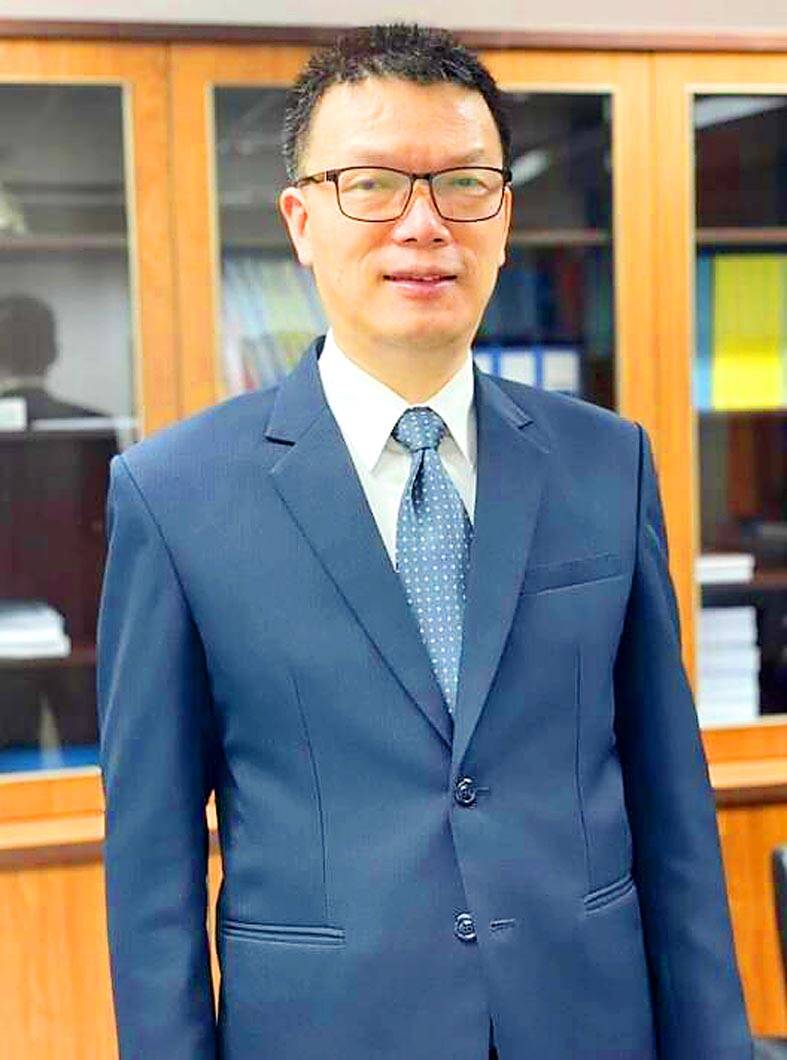National Communications Commission (NCC) Commissioner Chen Chung-shu (陳崇樹) would serve as acting chairman of the agency starting tomorrow, the Executive Yuan said yesterday.
The announcement comes ahead of an amendment to the National Communications Commission Organization Act (國家通訊傳播委員會組織法) that is scheduled to take effect from tomorrow. The amendment would ban commissioners from serving more than two terms or serving in an extended term.
Acting NCC Chairman Wong Po-tsung (翁柏宗) has served more than two terms and therefore must step down under the new rules.

Photo: Screengrab from NCC’s Webpage
Following Wong’s departure tomorrow, only Chen and two other NCC commissioners — Wang Yi-hui (王怡惠) and Wang Jiang-jia (王正嘉) — would remain, short of the quorum required to convene a rule-making meeting.
This would be the first time since the establishment of the commission in 2016 that it would only have three members on its board.
NCC Secretary-General Huang Wen-che (黃文哲) said that the three remaining NCC commissioners can only hold consultation meetings and cannot issue rulings on cases related to 104 items regulated by the agency, such as broadcast license renewals and telecom mergers.
Chen holds a master’s degree in electrical engineering from National Taiwan University. His expertise is in the field of telecommunications.
He has served as NCC chief secretary and director of the agency’s infrastructure and cybersecurity division.

Alain Robert, known as the "French Spider-Man," praised Alex Honnold as exceptionally well-prepared after the US climber completed a free solo ascent of Taipei 101 yesterday. Robert said Honnold's ascent of the 508m-tall skyscraper in just more than one-and-a-half hours without using safety ropes or equipment was a remarkable achievement. "This is my life," he said in an interview conducted in French, adding that he liked the feeling of being "on the edge of danger." The 63-year-old Frenchman climbed Taipei 101 using ropes in December 2004, taking about four hours to reach the top. On a one-to-10 scale of difficulty, Robert said Taipei 101

Taiwanese and US defense groups are collaborating to introduce deployable, semi-autonomous manufacturing systems for drones and components in a boost to the nation’s supply chain resilience. Taiwan’s G-Tech Optroelectronics Corp subsidiary GTOC and the US’ Aerkomm Inc on Friday announced an agreement with fellow US-based Firestorm Lab to adopt the latter’s xCell, a technology featuring 3D printers fitted in 6.1m container units. The systems enable aerial platforms and parts to be produced in high volumes from dispersed nodes capable of rapid redeployment, to minimize the risk of enemy strikes and to meet field requirements, they said. Firestorm chief technology officer Ian Muceus said

MORE FALL: An investigation into one of Xi’s key cronies, part of a broader ‘anti-corruption’ drive, indicates that he might have a deep distrust in the military, an expert said China’s latest military purge underscores systemic risks in its shift from collective leadership to sole rule under Chinese President Xi Jinping (習近平), and could disrupt its chain of command and military capabilities, a national security official said yesterday. If decisionmaking within the Chinese Communist Party has become “irrational” under one-man rule, the Taiwan Strait and the regional situation must be approached with extreme caution, given unforeseen risks, they added. The anonymous official made the remarks as China’s Central Military Commission Vice Chairman Zhang Youxia (張又俠) and Joint Staff Department Chief of Staff Liu Zhenli (劉振立) were reportedly being investigated for suspected “serious

Nipah virus infection is to be officially listed as a category 5 notifiable infectious disease in Taiwan in March, while clinical treatment guidelines are being formulated, the Centers for Disease Control (CDC) said yesterday. With Nipah infections being reported in other countries and considering its relatively high fatality rate, the centers on Jan. 16 announced that it would be listed as a notifiable infectious disease to bolster the nation’s systematic early warning system and increase public awareness, the CDC said. Bangladesh reported four fatal cases last year in separate districts, with three linked to raw date palm sap consumption, CDC Epidemic Intelligence